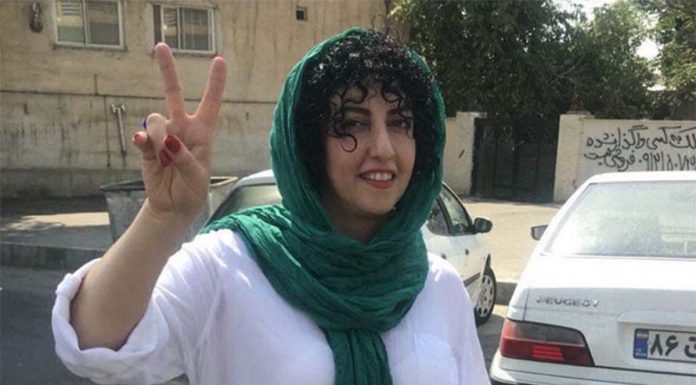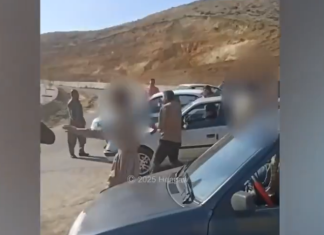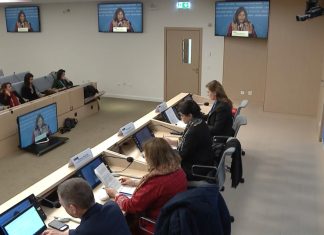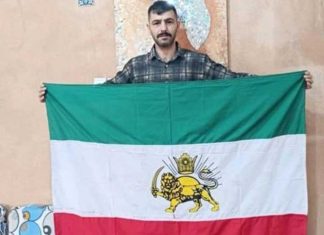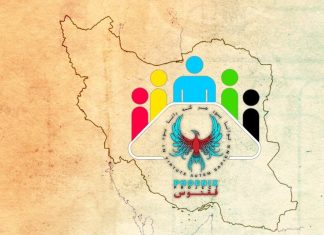By Kayhan Life Staff
Narges Mohammadi is an Iranian human rights campaigner who was released from jail in October and was recently sentenced to 30 months in prison, 80 lashes and two fines. She is vice president of the Tehran-based Defenders of Human Rights Center.
On May 31, Mohammadi took part in a press conference held on the invitation-only social network application Clubhouse. She spoke about a wide range of issues, including the likelihood of regime change in Iran, the forthcoming presidential elections, and the effects of the Islamic Republic’s human rights record on the ongoing Vienna talks, which center on the U.S. rejoining the 2015 Joint Comprehensive Plan of Action (JCPOA), better known as the Iran nuclear deal.
The Stockholm-based Baran Publishing organized the press conference. In 2020, Baran published Mohammadi’s book “White Torture” (featuring interviews with 13 female political prisoners), which was written in Persian.
Several international reporters participated in the press conference, which was conducted in English with the help of a Persian-language interpreter.
Nazenin Ansari, publisher of Kayhan Life as well as of the Persian-language Kayhan London, asked Mohammadi what gave her the inner strength to continue her challenging mission and whether she saw any signs of fundamental change in Iran.
“Even though I don’t have any hope for reforms or a change of behavior in the Islamic Republic, I have a lot of hope in Iranian society,” she replied. “We have many valuable social movements in Iran that have gained important experience, particularly in the last two decades. We have had thousands of people-driven organizations that have been working in the social, political, economic and development fields, and because of the spread of education as well as access to free media, the general awareness in our country has increased.”
“After two decades of continuous efforts by the people of Iran,” she added, “though it is true that we have not reached our ultimate goal of democracy, we have made important achievements along the way. My assessment of the potential towards democracy is that even though democracy cannot be achieved in one go, there can be multiple efforts in parallel to one another that can smooth the way towards democracy. I am very hopeful.”
Asked by reporter Negin Shiraghaei if Iran’s human rights record had any impact on the Vienna talks, Mohammadi replied: “Human rights must be the central issue for the European Union, the international community and any country that plans to engage in economic, trade and nuclear energy talks with Iran.”
“I hope that instead of keeping Iran’s human rights record in a desk drawer, they put it in the center of the negotiation table,” said Mohammadi. “They must enter the talks only after Iran guarantees to uphold human rights.”
“Some people believe human rights should be discussed on the sidelines of the talks. I am afraid I have to disagree with that approach,” Mohammadi argued. “I believe human rights must be at the center of the talks.”
Mohammadi said she believed in sanctioning human rights violators, “those who oppress people and those who are close to the body of the Islamic Republic. I believe in minimizing their presence in the international arena and am supportive of these sanctions.”
Mohammadi was released from jail in October when her 10-year sentence was commuted, after serving eight and a half years for “forming and managing an illegal group,” among other charges.
The 49-year-old mother of two is a distinguished human rights defender, a supporter of the anti-death penalty campaign Legam (Step by Step to Abolish the Death Penalty) and deputy chair of the Defenders of Human Rights Center in Iran, founded by Nobel Peace Prize laureate Shirin Ebadi. (Mohammadi has been close to Ebadi, having first served as the center’s spokeswoman before Ebadi left Iran after the disputed re-election of then-President Mahmoud Ahmadinejad in 2009.)
On Clubhouse, Mahshid Hosseini, a reporter from the UK-based Persian-language Manoto TV, asked Mohammadi why she would boycott the forthcoming presidential elections, given she had previously said that “ballot boxes were the solution.”
“I will do my utmost to persuade people not to take part in the elections,” she said. “An election will have no actual effects on society if it does not guarantee people’s political liberties, including freedom of speech and the right to peaceful assembly. Elections do not always represent the will of the people.”
“In Iran, elections do not reflect the true will of the people, but this is nothing new,” Mohammadi noted. “The same situation existed in all previous elections.”
“I believe elections and ballot boxes are ineffective,” Mohammadi argued. “[President Hassan] Rouhani betrayed the country during the nationwide protests in October 2019, which caused many deaths. We have posed a challenge to the oppressive governing system in Iran by boycotting the elections.”
Iran’s Khamenei Backs Hardliner Versus Hardliner Presidential Vote
ANALYSIS: Iran’s June Elections Loom Over Vienna Talks, U.S. Rejoining Nuclear Deal
Elsewhere, she highlighted the role of the United Nations and explained: “The UN must intervene and improve people’s lives and protect their fundamental rights. Before entering talks with Iran, Western governments must ensure that the state would place the interests of its citizens above the government’s agenda by guaranteeing political freedom and safeguarding human rights of the people.”
In a 24 May post on her Instagram account, Mohammadi wrote that she had been sentenced to a prison term, flogging and fines in relation to her peaceful human-rights activities during her previous unjust imprisonment. The court had issued the verdict a day earlier in response to “offenses” which included participating in a sit-in with other prisoners in the women’s ward of Tehran’s Evin prison between December 21 and 24, 2019 to protest the killings of protesters during nationwide protests in November of that year, issuing statements condemning the death penalty and speaking out publicly about how prison, security and judicial officials subjected her to torture and other ill-treatment during and shortly after her peaceful sit-in.
The European Union has called on Iran to review Mohammadi’s case in compliance with the applicable international human rights law and taking into account her deteriorating health condition.
During the Clubhouse exchange, Mohammadi also spoke about her book on white torture written while at the Evin Prison in a ward with female political prisoners. She began the second volume a week after her release, she said, documenting 14 narratives of women who had experienced solitary confinement.
So far 60 individuals have filed a complaint with the judiciary of the Islamic Republic, according to Mohammadi, identifying the persons who placed them in solitary confinement, and specifying the duration of their solitary confinement and their experience.
“When I was in the public ward of Evin prison,” she said, “I noticed that women returning from solitary confinement often consumed numerous drugs for mental health issues. They told me that they were not taking any of these drugs prior to their solitary confinement and that these drugs were prescribed to them by doctors during their time in solitary confinement.”
Speaking about the connection between sexual abuse, violence and these mental health issues, Mohammadi said:
“In the year 1389 of the Iranian calendar, I was in Ward No. 209 of Evin Prison which belongs to the Intelligence Services. After a few days of being alone in solitary confinement, I was joined by another woman. This woman recounted her experience of physical and sexual abuse at the hands of her interrogators who had groped her. She had fallen ill with a serious mental illness as a result and was taking sleeping pills even during the day and sleeping, sometimes with three blankets on her head, to the point that I was not even sure that she was breathing. She told me that she had later had a nervous breakdown and was even taken to the hospital but was transferred back to the prison afterwards.”

